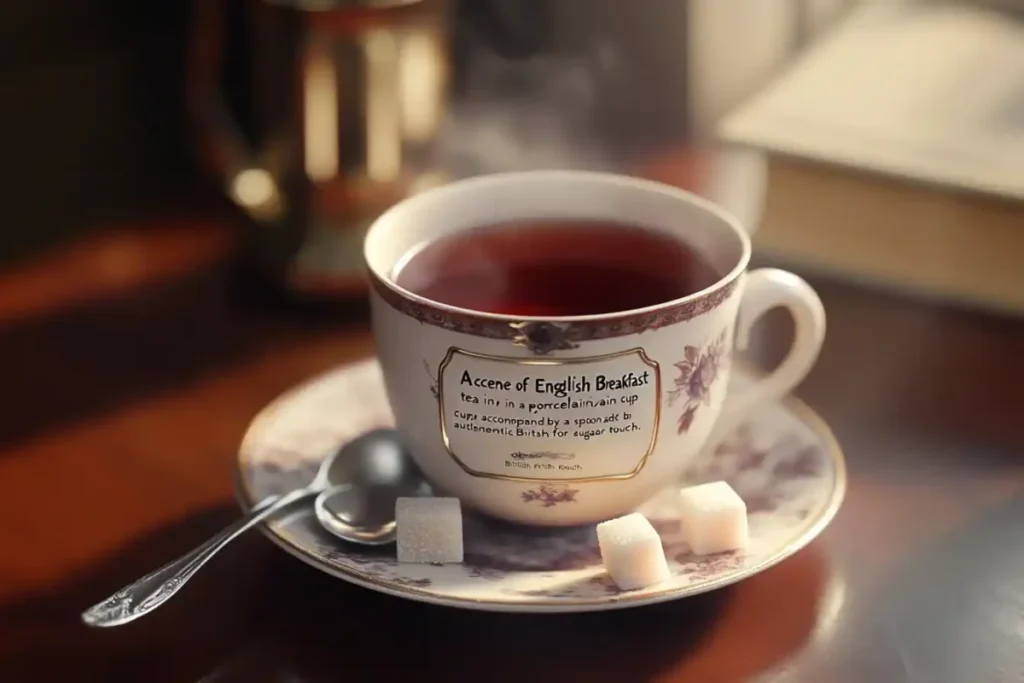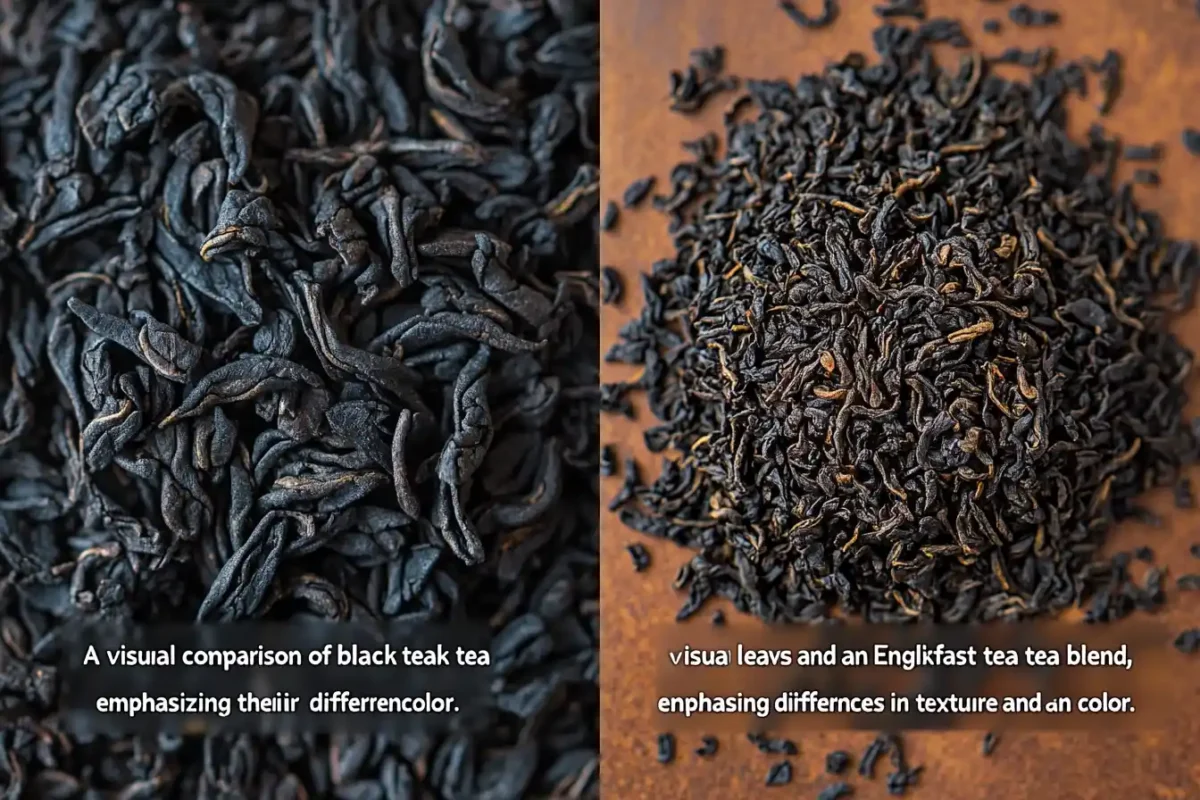Introduction
Tea holds a special place in many cultures, uniting people over its warm embrace and rich flavors. Among the vast varieties, black tea and English Breakfast tea remain particularly celebrated. Though they often appear interchangeable, these teas have distinct characteristics that cater to different preferences and purposes.
Black tea, known for its robust flavors and deep amber hue, serves as the foundation for English Breakfast tea. But here’s the catch—English Breakfast is a blend, purposefully crafted for a hearty morning cup. Both are revered for their bold taste and health benefits, yet each has its own charm and story to tell.
In this article, we’ll explore every aspect of these teas, from their origins and flavor profiles to how they are brewed and enjoyed. Let’s uncover the differences while appreciating the commonalities that make both teas timeless classics.
Understanding Black Tea
Black tea, one of the most popular and widely consumed types of tea worldwide, stands out for its bold flavor and rich cultural significance. It is a versatile tea, forming the base for countless blends, including English Breakfast tea. To truly understand the differences between black tea and English Breakfast tea, we must first dive into what makes black tea unique.
Definition and Characteristics of Black Tea
Black tea is derived from the Camellia sinensis plant, the same plant that produces green, white, and oolong teas. What sets it apart is the oxidation process. The tea leaves are fully oxidized, which enhances their flavor, giving them a deep, malty taste and darker color.
Notably, black tea is often enjoyed plain, but its robust flavor can handle milk, sugar, or even spices. From its tannins to its antioxidant properties, black tea is as much a beverage as it is an experience, offering a balance of bitterness and warmth that few other teas can rival.

Varieties of Black Tea
The world of black tea is vast, encompassing a range of regional specialties and blends. Some of the most renowned types include:
- Assam Tea: Grown in India, Assam tea is malty and strong, ideal for morning brews.
- Darjeeling Tea: Often called the “champagne of teas,” this Indian tea is lighter, with floral and muscatel notes.
- Ceylon Tea: Hailing from Sri Lanka, this tea offers a brisk, citrusy flavor that pairs wonderfully with sweeteners or milk.
- Kenyan Tea: Known for its bold, earthy flavor, Kenyan black tea is often used in blends like chai.
Each type of black tea has its unique qualities, but all share a full-bodied flavor profile that is distinct from green or white teas.
Whether sipped in its pure form or as part of a blend, black tea offers a diverse palette of flavors and styles. As the backbone of English Breakfast tea, it provides the foundation for one of the world’s favorite morning drinks. But what exactly makes English Breakfast tea different? Let’s explore further in the next part.
Understanding English Breakfast Tea
English Breakfast tea is a celebrated blend that has stood the test of time, becoming a quintessential part of morning routines around the world. Built upon the foundation of black tea, this blend has a unique identity shaped by its composition and cultural heritage.
Definition and Characteristics of English Breakfast Tea
English Breakfast tea is a robust blend primarily composed of Assam, Ceylon, and occasionally Kenyan black teas. Its full-bodied flavor is specifically crafted to complement a hearty breakfast, often with milk and sugar to mellow its strength. Unlike single-origin black teas, English Breakfast relies on blending to achieve a balanced, consistent taste.
The defining trait of this blend is its bold, malty, and slightly smoky profile. It offers a rich, invigorating experience that many rely on to kickstart their day. While some may consider it a subset of black tea, the deliberate blending process sets English Breakfast apart.
Origins and History of English Breakfast Tea
The origins of English Breakfast tea trace back to the early 19th century, when tea was becoming a staple in British households. Legend has it that the blend was popularized by a Scottish tea master, who sought to create a tea strong enough to pair with the traditional English breakfast. Its rise in popularity was fueled by its compatibility with milk, a British tea-drinking tradition.
Over time, the blend evolved, with contributions from different tea-growing regions like India and Sri Lanka, which added depth and complexity to its flavor. Today, English Breakfast tea is not just a beverage but a cultural icon, symbolizing comfort, tradition, and the art of tea blending.
While English Breakfast tea has its roots firmly planted in the world of black tea, its crafted nature and specific purpose give it a unique identity. As we move forward, we’ll delve into the specific differences between black tea and English Breakfast tea to understand how each stands apart in flavor, composition, and more.

Key Differences Between Black Tea and English Breakfast Tea
While both black tea and English Breakfast tea share common origins, their differences lie in their composition, flavor, and purpose. Each has a unique identity that caters to specific preferences, making them staples in the world of tea.
Composition and Blending
The most significant distinction lies in their composition. Black tea refers to a category of tea made from fully oxidized leaves of the Camellia sinensis plant. It can come from a single region, like Assam or Darjeeling, showcasing unique characteristics tied to its origin.
English Breakfast tea, on the other hand, is a blend of different black teas. It often combines the boldness of Assam, the brightness of Ceylon, and occasionally the smooth earthiness of Kenyan tea. The blend is carefully crafted to maintain consistency in flavor, ensuring each cup delivers a full-bodied, malty taste.
This blending process also sets English Breakfast tea apart from single-origin black teas, making it a curated beverage designed for a specific flavor profile and strength.
Flavor Profiles
Black tea offers a diverse range of flavors depending on its variety and origin. For instance:
- Assam: Malty and brisk with a strong, hearty flavor.
- Darjeeling: Delicate and floral, with subtle muscatel undertones.
- Ceylon: Bright and citrusy, with a hint of spice.
English Breakfast tea, in contrast, delivers a consistent flavor. It is robust and malty, with a balanced bitterness that pairs well with milk or sweeteners. While black teas can range from mild to strong, English Breakfast leans toward a bold, uniform taste, ideal for complementing savory foods.
Caffeine Content
Another notable difference is caffeine content. Both black tea and English Breakfast tea are caffeinated, but the levels can vary based on the specific tea leaves and brewing method.
- Black tea: Caffeine levels differ depending on the type (e.g., Darjeeling has less caffeine than Assam).
- English Breakfast: Generally contains a higher, more consistent level of caffeine because it is designed as a morning pick-me-up.
This makes English Breakfast tea a popular choice for those looking for a reliable energy boost to start the day.
Understanding these differences highlights the distinct roles of black tea and English Breakfast tea. While black tea offers a world of variety and complexity, English Breakfast delivers a dependable blend tailored for a bold and hearty experience. Next, we’ll explore how brewing techniques can further enhance these teas’ unique qualities.
Brewing Techniques
Brewing is an essential part of experiencing the full potential of any tea, and both black tea and English Breakfast tea have their own optimal methods. While the basics of steeping remain consistent, subtle variations can enhance the unique flavors of each.

Optimal Brewing Methods for Black Tea
To brew the perfect cup of black tea, attention to detail is key. Since black tea comes in a variety of types, each may require slight adjustments for the best results.
- Water Temperature: Black tea is best brewed with water heated to about 200°F (just below boiling). Overheating can scald the leaves, while cooler water might not extract all the flavors.
- Tea-to-Water Ratio: Use one teaspoon of loose leaves (or one teabag) per 8 ounces of water. Adjust for a stronger or milder taste as desired.
- Steeping Time: Steep black tea for 3–5 minutes. Shorter times yield a lighter flavor, while longer steeping brings out stronger, bolder notes. However, over-steeping can result in bitterness due to tannins.
- Serving Suggestions: Depending on the variety, black tea can be enjoyed plain, with a slice of lemon, or sweetened with honey. Milk can also be added for a creamier texture.
Each variety, whether it’s Assam or Darjeeling, has its own ideal brewing nuances, making black tea a versatile option for any tea enthusiast.
Optimal Brewing Methods for English Breakfast Tea
As a blend specifically designed for consistency, English Breakfast tea thrives under a straightforward brewing process. Its robust nature is well-suited for pairing with milk or sweeteners.
- Water Temperature: Similar to black tea, English Breakfast tea should be brewed with water at 200°F to ensure maximum flavor extraction.
- Tea-to-Water Ratio: One teaspoon of tea leaves or a single teabag per 8 ounces of water works best. The blend’s strength makes it ideal for adding milk without losing flavor.
- Steeping Time: Steep English Breakfast tea for 4–5 minutes. This brings out its full-bodied, malty character while avoiding over-extraction.
- Serving Suggestions: Traditionally, English Breakfast tea is served with milk and sugar. This complements its robust flavor, making it a comforting morning beverage.
Brewing brings out the best in these teas, allowing their unique flavors to shine. Whether you’re savoring a delicate black tea or enjoying the hearty richness of English Breakfast, the brewing process is an art that can transform your tea-drinking experience. Up next, we’ll delve into the cultural significance and the roles these teas play across different traditions.
Cultural Significance and Consumption
Tea is more than a beverage; it’s a cultural phenomenon. Both black tea and English Breakfast tea have deep-rooted traditions and play pivotal roles in various cultures. Their histories and usage reflect how these teas are woven into daily life, rituals, and hospitality.
Black Tea in Global Cultures
Black tea is a global favorite, transcending geographical boundaries and adapting to diverse cultural practices. Each region brings its own flair to how black tea is prepared and enjoyed.
- China: Black tea, often called “red tea” locally, holds a prominent place in Chinese tea ceremonies. Varieties like Keemun are prized for their smoky flavor and subtle sweetness.
- India: Black tea is the backbone of chai, a spiced milk tea that is a staple in Indian households. Regions like Assam and Darjeeling are renowned for producing some of the world’s finest black teas.
- Russia: In Russia, black tea is traditionally brewed in a samovar and served strong with sugar or lemon, showcasing a robust and warming flavor.
- Middle East: Black tea is commonly served with a generous amount of sugar or mint, symbolizing hospitality and friendship.
Across the globe, black tea has become a symbol of community, comfort, and tradition.
English Breakfast Tea in British Culture
English Breakfast tea, on the other hand, is quintessentially British. It is a cornerstone of the nation’s tea-drinking habits and is steeped in cultural significance.
- Morning Rituals: The blend was designed specifically for mornings, pairing perfectly with a hearty English breakfast. Its strong flavor complements traditional fare like eggs, sausages, and toast.
- Tea Time Tradition: English Breakfast tea is also a favorite during afternoon tea, served alongside scones, clotted cream, and delicate sandwiches.
- Symbol of British Identity: The practice of enjoying tea with milk is closely associated with English Breakfast tea, reinforcing its iconic status in British households.
The tea’s versatility and robust profile make it adaptable for different occasions, solidifying its role as a symbol of British heritage.
From bustling Indian streets to elegant British tea rooms, black tea and English Breakfast tea have carved unique spaces in the hearts of tea lovers worldwide. Their cultural importance elevates them beyond beverages, turning them into experiences that bring people together. Next, let’s explore the health benefits that make these teas not only enjoyable but also beneficial for well-being.
Health Benefits and Considerations
Both black tea and English Breakfast tea are not only delightful beverages but also powerhouses of health benefits. Packed with antioxidants and other bioactive compounds, these teas can support various aspects of physical and mental well-being. Understanding their health implications can help you make informed choices about incorporating them into your lifestyle.
Health Benefits of Black Tea
Black tea is celebrated for its health-boosting properties, thanks to its rich nutrient profile. Some of its key benefits include:
- Rich in Antioxidants: Black tea contains polyphenols such as flavonoids and catechins, which help combat oxidative stress and reduce inflammation in the body.
- Heart Health: Studies suggest that regular consumption of black tea may lower cholesterol levels and improve blood vessel function, reducing the risk of heart disease.
- Improved Digestion: The tannins in black tea can support gut health by promoting the growth of beneficial gut bacteria.
- Mental Alertness: Thanks to its moderate caffeine content, black tea can enhance focus, energy, and mental clarity without causing the jitteriness associated with coffee.
- Reduced Risk of Chronic Diseases: Long-term consumption of black tea has been linked to a lower risk of conditions such as diabetes and certain cancers.
Although black tea offers numerous advantages, moderation is key, as excessive consumption can lead to caffeine sensitivity or digestive discomfort.
Health Benefits of English Breakfast Tea
As a blend of black teas, English Breakfast tea shares many of the same health benefits, with a few additional considerations due to its blend-centric nature.
- Consistent Nutrient Profile: The carefully selected black teas in English Breakfast ensure a steady supply of antioxidants, enhancing its potential to combat free radicals and protect cells.
- Energy Boost: English Breakfast tea’s robust flavor and higher caffeine content make it an excellent morning drink to kickstart your day with focus and energy.
- Bone Health: Studies have indicated that regular tea drinkers, including those who consume blends like English Breakfast, may have improved bone density, potentially due to tea’s flavonoid content.
- Stress Reduction: The comforting and familiar flavor of English Breakfast tea can have a calming effect, making it a perfect choice for moments of relaxation.
English Breakfast tea, when served with milk, provides an additional source of calcium, making it a heartier option compared to plain black tea.
Considerations When Consuming These Teas
While both teas have substantial health benefits, it’s important to consider a few factors:
- Caffeine Sensitivity: Both teas contain caffeine, which can affect sleep patterns or cause restlessness if consumed in excess.
- Tannin Content: The tannins in black tea may interfere with iron absorption, so it’s best to avoid drinking it immediately after meals high in iron.
- Additives: Adding too much sugar or sweeteners can diminish the health benefits of these teas. Opt for natural options like honey or enjoy them plain.
By integrating black tea or English Breakfast tea into your routine, you can reap a host of health benefits while indulging in their rich, satisfying flavors. Up next, we’ll address frequently asked questions to clear up common queries and deepen your understanding of these iconic teas.
Frequently Asked Questions : What is the Difference Between Black Tea and English Breakfast
To wrap up our exploration of black tea and English Breakfast tea, here are answers to some common questions. These FAQs address the nuances and everyday curiosities surrounding these two popular teas.
Is English Breakfast Tea a Type of Black Tea?
Yes, English Breakfast tea is a type of black tea. Specifically, it is a blend of black teas, typically including Assam, Ceylon, and occasionally Kenyan tea. The blend is crafted to create a robust and consistent flavor, ideal for a strong and satisfying morning beverage.
Can I Substitute Black Tea for English Breakfast Tea?
You can substitute black tea for English Breakfast tea in most cases, but the experience may vary. Black tea, especially single-origin varieties like Darjeeling or Assam, will have a more distinct flavor profile compared to the blended taste of English Breakfast tea. While the substitution works in recipes or casual drinking, it may not offer the same consistency.
Which Has More Caffeine: Black Tea or English Breakfast Tea?
The caffeine content of both teas is comparable, but English Breakfast tea often has slightly higher levels. This is because it is specifically blended to provide a robust, energizing effect. However, the exact caffeine content can vary depending on the blend and brewing time.
How Should I Serve English Breakfast Tea?
English Breakfast tea is traditionally served with milk and sugar, making it a comforting and hearty drink. For a lighter version, you can enjoy it plain or with a touch of honey. Adding a splash of milk enhances its rich, malty flavor, making it a perfect companion to breakfast foods.
Is Black Tea Better for Health Than English Breakfast Tea?
Both teas offer similar health benefits since English Breakfast tea is a blend of black teas. The choice between them depends on personal preference. If you enjoy exploring unique regional flavors, single-origin black teas may appeal to you. For a balanced, consistent taste, English Breakfast tea is the way to go.
Can I Drink English Breakfast Tea at Night?
While it’s generally enjoyed in the morning due to its energizing properties, English Breakfast tea can be consumed at night if you prefer. However, its caffeine content might disrupt sleep for those sensitive to caffeine. Opt for decaffeinated versions if you want to enjoy the flavor without the stimulation.
As these FAQs show, understanding the characteristics and versatility of black tea and English Breakfast tea enhances the tea-drinking experience. Up next, we’ll conclude by summarizing their unique roles and celebrating their enduring popularity.
Conclusion
Tea, in its many forms, has an undeniable charm that transcends cultures, time, and preferences. Among the most revered are black tea and English Breakfast tea—two beverages that share a common heritage yet boast distinct identities. Understanding their differences enriches the experience of savoring each cup, whether you prefer the diverse, nuanced flavors of black tea or the bold, consistent taste of English Breakfast tea.
Black tea, with its rich array of varieties like Assam, Darjeeling, and Ceylon, offers an exciting exploration of regional characteristics and unique flavor profiles. On the other hand, English Breakfast tea, a blend crafted for strength and consistency, provides a hearty, energizing experience, especially when paired with milk or sugar.
From brewing techniques to cultural significance, these teas cater to diverse tastes and occasions, making them staples in households worldwide. Their health benefits, versatility, and comforting nature elevate them beyond mere beverages—they are rituals, memories, and connections in liquid form.
So, the next time you reach for a steaming cup of tea, remember the stories and traditions steeped in every sip. Whether it’s a tranquil moment with black tea or a vibrant start to the day with English Breakfast tea, you’re partaking in a legacy that spans centuries.
Enjoy the journey, one cup at a time. 🍵

